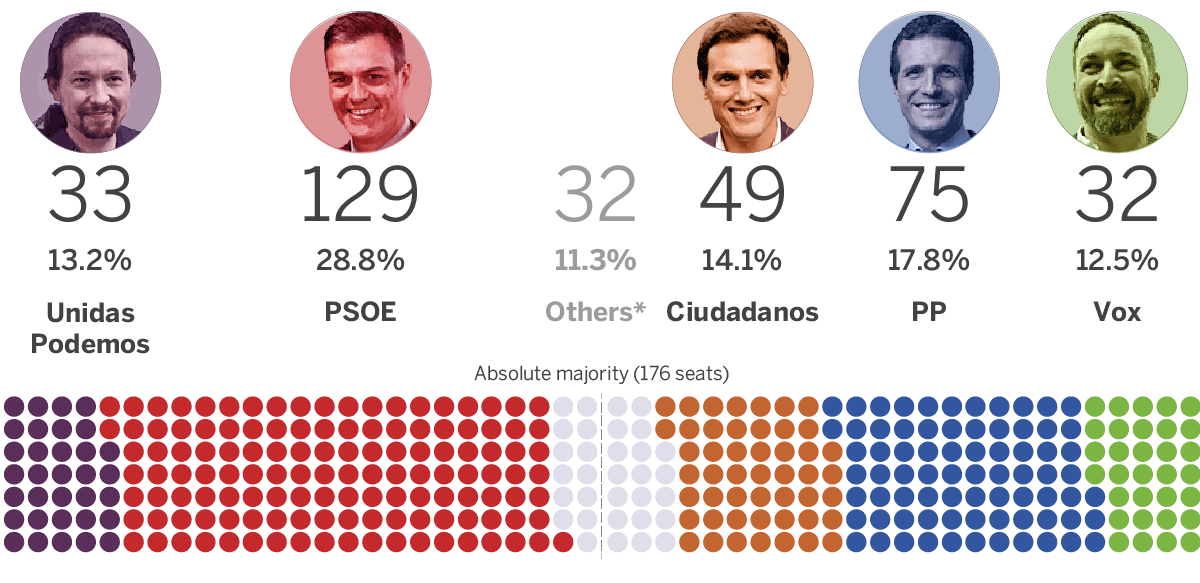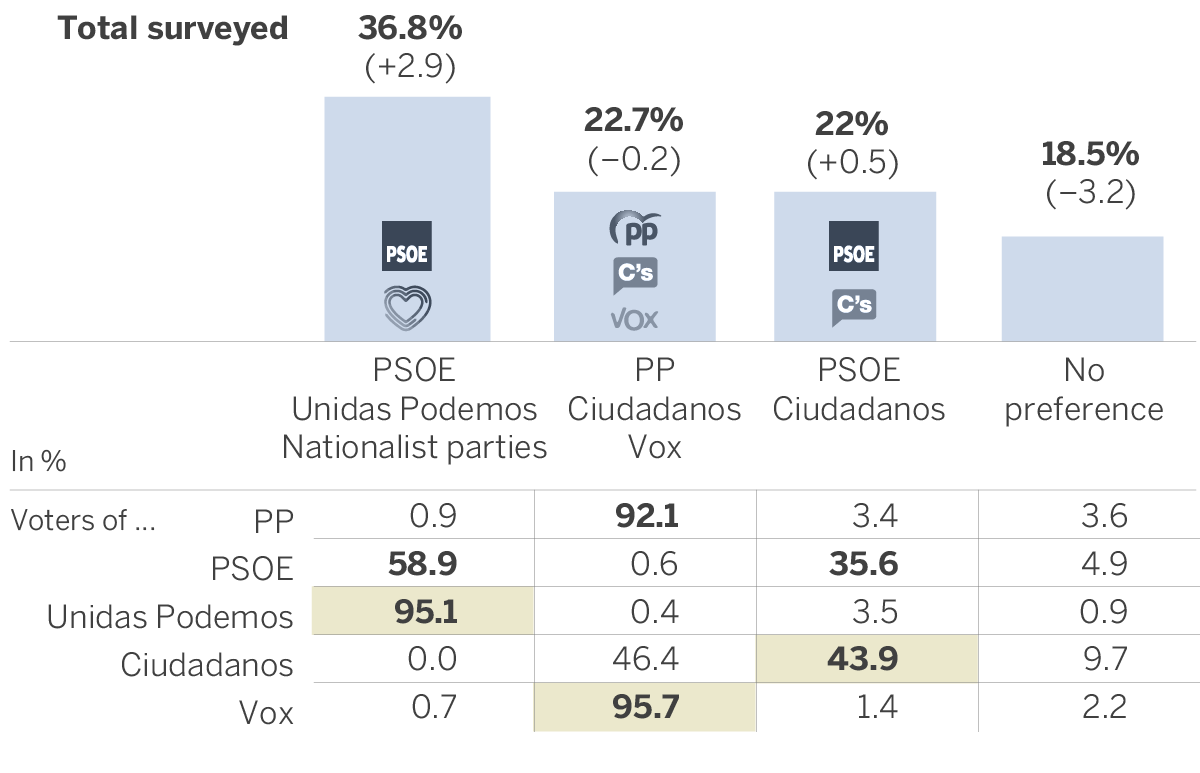Spain’s election campaign heats up ahead of televised debates
With less than a week to go before the April 28 polls, Spanish political parties are scrambling to win over undecided voters

The leaders of Spain’s four main political parties will appear in two televised debates this week in a bid to win over undecided voters ahead of the general election on April 28. The first debate will take place on Monday at 10pm on the Spanish public television network RTVE, and the second 24 hours later on Tuesday at 10pm on the private network Atresmedia.
This unusual scenario came about after Spain’s election officials suspended a debate on Tuesday that would have included the far-right party Vox, on the grounds that the party’s presence would violate rules on minimum congressional representation. Vox currently has no deputies in Spain’s lower house of parliament, although it did win seats in last year’s regional elections in Andalusia.
VOTER INTENTION SURVEY
Deputies and estimated % of vote

Fuente: 40dB. EL PAÍS
Prime Minister Pedro Sánchez of the Socialist Party (PSOE) wanted there to just be one debate with the public station on Tuesday but was forced to back down after the candidates of the three opposition parties said they would not attend unless the date was changed.
Each candidate is hoping to use the debate to sway undecided voters before polling day on Sunday
Sánchez will be joined on stage by Albert Rivera, the leader of the center-right party Ciudadanos (Citizens), Pablo Iglesias, the leader of the anti-austerity party Unidas Podemos, and Pablo Casado, the leader of the conservative Popular Party (PP).
Each candidate is hoping to use the debate to sway undecided voters before polling day on Sunday, April 28. According to the latest survey by 40dB, commissioned by EL PAÍS, 28% of voters remain undecided. The survey shows that the PSOE remains the clear favorite and predicts the party will take 28.8% of the vote and 129 seats in Congress. But this still falls short of the 176 seats needed for an absolute majority, meaning Sánchez will need the support not only of Podemos, but also of regional parties if he is to form a government.
PREFERRED PACTS
If no party wins an absolute majority, which of the following pacts or power-sharing agreements would you prefer? (In parenthesis, the difference in percentage from March survey)

According to the 40dB survey, 36.8% of those interviewed prefer an alliance with the Socialists, Unidas Podemos and the nationalist Basque and Catalan parties – in other words, the same alliance that supported the no-confidence motion last year that saw then-Prime Minister Mariano Rajoy ousted from power. The poll found that 22.7% would prefer an alliance between the PP, Ciudadanos and Vox. According to the survey, those three parties would win a total of 156 seats.
With so much hanging in the balance, all eyes will be on this week’s debates. Casado and Rivera are hoping to improve their numbers; Iglesias believes he can win back voters with his debating skills; and Sánchez wants to mobilize the left and combat voter apathy. According to sources close to Casado, the PP leader will not attack Ciudadanos and will instead focus on Sánchez as “the common enemy.” Sources close to Rivera say that the Ciudadanos leader will try to pressure the PSOE leader on the issue of the Catalan independence drive. Meanwhile, Sánchez will try to appeal to centrist voters and warn about the risk of a right-wing government.
Seven in 10 Spaniards consider electoral debates as necessary, according to the consultancy firm Barlobento Comunicación.
English version by Melissa Kitson.
Tu suscripción se está usando en otro dispositivo
¿Quieres añadir otro usuario a tu suscripción?
Si continúas leyendo en este dispositivo, no se podrá leer en el otro.
FlechaTu suscripción se está usando en otro dispositivo y solo puedes acceder a EL PAÍS desde un dispositivo a la vez.
Si quieres compartir tu cuenta, cambia tu suscripción a la modalidad Premium, así podrás añadir otro usuario. Cada uno accederá con su propia cuenta de email, lo que os permitirá personalizar vuestra experiencia en EL PAÍS.
¿Tienes una suscripción de empresa? Accede aquí para contratar más cuentas.
En el caso de no saber quién está usando tu cuenta, te recomendamos cambiar tu contraseña aquí.
Si decides continuar compartiendo tu cuenta, este mensaje se mostrará en tu dispositivo y en el de la otra persona que está usando tu cuenta de forma indefinida, afectando a tu experiencia de lectura. Puedes consultar aquí los términos y condiciones de la suscripción digital.








































